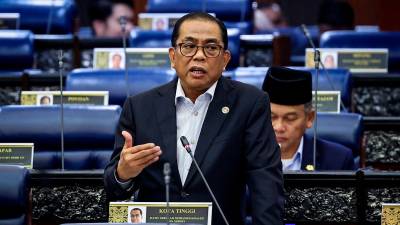KUALA LUMPUR: Defence Minister Datuk Seri Mohamed Khaled Nordin has emphasised the critical role of the National Service Training Programme in shaping Malaysian youth.
He stated that PLKN serves as a strategic intervention to develop disciplined, patriotic and resilient young citizens. The programme represents a long-term national investment beyond mere physical training according to the minister.
Mohamed Khaled highlighted the importance of instilling national values and defence consciousness in today’s complex world. He revealed concerning findings from the Malaysian Youth Index study conducted between 2015 and 2019. The study showed a noticeable decline in the youth identity domain which encompasses patriotism, volunteerism and unity.
The minister made these comments during his winding-up speech for the Defence Ministry’s 13th Malaysia Plan debate in Parliament. His statements came in response to a proposal by Datuk Seri Saifuddin Abdullah to scrap PLKN 3.0. The opposition member had suggested reallocating the programme’s funding to other ministries.
Since the relaunch of PLKN 3.0, significant participation numbers have been recorded according to the defence minister. Mohamed Khaled reported that 40 trainees had joined the young soldier training programme while 148 trainees had enlisted in the Territorial Army. These numbers are expected to increase further as the programme expands from next year.
The nation must build a segment of society that truly understands national security and defence issues according to the minister. He stressed that this understanding should extend beyond general knowledge to comprehensive awareness.
Regarding defence capabilities in Sabah, Mohamed Khaled confirmed the government’s ongoing commitment to strengthening security. Plans include installing long-range air defence radars in Pulau Layang-Layang and Tawau for complete 360-degree coverage. Additionally, eight Coastal Surveillance System radars will operate to monitor territorial waters effectively.
Air superiority in Sabah’s airspace will be enhanced through several acquisitions according to the defence minister. The Malaysian Armed Forces will acquire the ANKA Unmanned Aerial System, LCA FA-50 aircraft and Maritime Patrol Aircraft. All these assets will be based in Sabah to strengthen regional security.
The military is planning to acquire an additional four Coastal Surveillance Radars for enhanced maritime surveillance. Part of the Littoral Mission Ship and Littoral Combat Ship fleet will also be stationed in Sabah once received. Plans include replacing the Tun Sharifah Rodziah Sea Base with a mobile Forward Operating Base to reinforce security operations in Eastern Sabah.
Regarding the proposed purchase of second-hand FA-18 Hornet fighter jets from Kuwait, Mohamed Khaled provided an update. Discussions have been held and the United States has expressed no objection to Kuwait selling the jets to Malaysia. Several processes still need completion including an assessment by the Royal Malaysian Air Force team next month.
The RMAF team will evaluate readiness, deficiencies and upgrade requirements for the potential aircraft purchase. Mohamed Khaled noted that although the US has agreed, delivery would only occur after Kuwait receives its new additional jets from the US. If this process takes too long, the ministry will consider alternative options including making all 18 Sukhoi jets fully operational by 2030.
The defence minister also mentioned the possibility of procuring new fifth-generation jets from various countries. Potential suppliers include France, the United States or Russia for these advanced aircraft.
The decision and evaluation process for new jet procurement will require considerable time according to Mohamed Khaled. He indicated that a final decision might only be made by 2033 or 2034 with complete aircraft replacement expected by 2040. – Bernama
